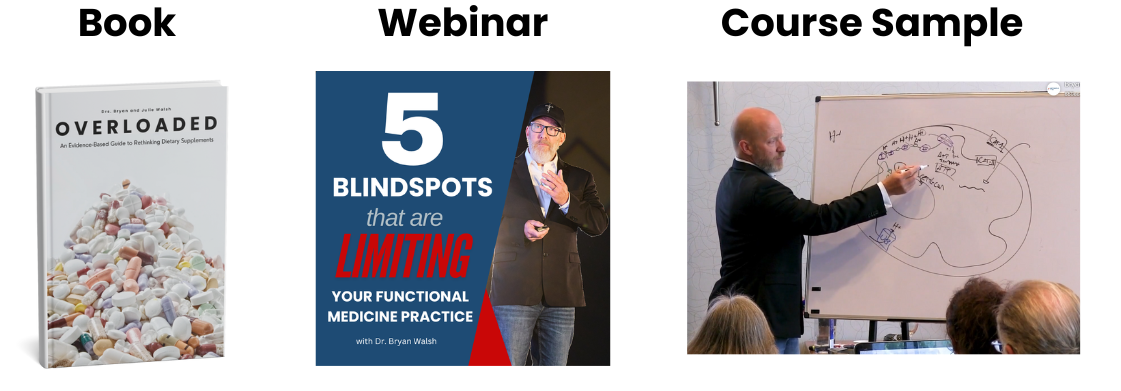Insulin - Villain or Scapegoat?
Sep 15
/
Drs. Bryan & Julie Walsh
Our culture loves to vilify things, don’t we?
We enjoy pointing the finger and finding something to blame. It’s easier, generally makes for a good story, and doesn’t require much thought.
What’s the cause of heart disease? That’s easy – cholesterol.
Why are you so tired all the time? Nailed it – adrenals!
What’s the cause of all things horrible with glucose dysregulation? I could do this with my eyes closed – insulin!
But you know the funny thing? We are horrible judges. We almost always accuse the wrong character and, in light of new information or research, that character is usually vindicated and set free. (We're looking at you, egg yolks.)
Let's look at three reasons why insulin should be added to your "falsely accused" list.
We enjoy pointing the finger and finding something to blame. It’s easier, generally makes for a good story, and doesn’t require much thought.
What’s the cause of heart disease? That’s easy – cholesterol.
Why are you so tired all the time? Nailed it – adrenals!
What’s the cause of all things horrible with glucose dysregulation? I could do this with my eyes closed – insulin!
But you know the funny thing? We are horrible judges. We almost always accuse the wrong character and, in light of new information or research, that character is usually vindicated and set free. (We're looking at you, egg yolks.)
Let's look at three reasons why insulin should be added to your "falsely accused" list.
1.
Insulin is anti-inflammatory
Hyperglycemia (high blood glucose) is considered very pro-inflammatory. There is speculation in the research that one of the reasons insulin increases during hyperglycemia is to combat the inflammation caused by high glucose. That would make sense – when there is inflammation, send in the anti-inflammatory troops.
2.
Insulin resistance is protective
Studies suggest that insulin resistance is a cellular defense mechanism to protect the body, not damage it. In other words, when there is metabolic anarchy inside of a cell, insulin resistance may provide the necessary reprieve.
On this, researchers are calling into question whether we should be giving hyperglycemic, hyperinsulinemic patients exogenous insulin, as that might further contribute to the intracellular chaos and worsen the condition.
Note: If you're doing similar things with herbs, it may not be such a great idea either.
3.
Insulin resistance is anti-microbial
Not only does the presence of lipopolysaccharides seem to cause insulin resistance, but during infection, there seems to be an increased glucose requirement by phagocytic cells. Insulin resistance facilitates glucose availability for those cells to help fight off an infection rather than giving it to other cells, like muscle or fat.
Take-Home Message
Are we saying "run out and take insulin"? No.
Are we saying insulin resistance isn't a serious condition that needs to be addressed? Also no.
Hyperglycemia and insulin resistance are real and problematic. What we're suggesting here is that there is more to the story.
Consider insulin's proposed actions in the body when determining what is going on in a patient.
In other words, if you have a patient with insulin resistance, instead of a knee-jerk reaction to grab the nearest bottle of berberine and fenugreek, look a little more deeply.
The patient could also have mild inflammation, oxidative stress, mitochondrial dysfunction, an infection, or something else that the body is responding to with insulin resistance. In this case, a bottle of berberine and fenugreek may lower glucose but could be making them worse in the process.
And listen, this is the tip of the we-don’t-know-as-must-as-we-think-we-do-about-insulin iceberg.
For example, did you know glucose can pretty easily get into cells without insulin?
Or that the true role of insulin doesn’t seem to be glucose disposal?
For more in-depth conversations about topics in Functional Medicine that really matter, join us in Clinician's Code. Learn more here.
Are we saying insulin resistance isn't a serious condition that needs to be addressed? Also no.
Hyperglycemia and insulin resistance are real and problematic. What we're suggesting here is that there is more to the story.
Consider insulin's proposed actions in the body when determining what is going on in a patient.
In other words, if you have a patient with insulin resistance, instead of a knee-jerk reaction to grab the nearest bottle of berberine and fenugreek, look a little more deeply.
The patient could also have mild inflammation, oxidative stress, mitochondrial dysfunction, an infection, or something else that the body is responding to with insulin resistance. In this case, a bottle of berberine and fenugreek may lower glucose but could be making them worse in the process.
And listen, this is the tip of the we-don’t-know-as-must-as-we-think-we-do-about-insulin iceberg.
For example, did you know glucose can pretty easily get into cells without insulin?
Or that the true role of insulin doesn’t seem to be glucose disposal?
For more in-depth conversations about topics in Functional Medicine that really matter, join us in Clinician's Code. Learn more here.
Get Free Functional Medicine Education
Thank you!
Policy Pages
Join our mailing list
Get updates and special offers right in your mailbox.
Thank you!
Learn the PRAL Score of 30 Common Foods
(Based on Portion Sizes)
And get started evaluating your diet today!
Enter your email address below to subscribe to our mailing list and get the guide free!
Thank you!
Grab our free Reactive Hypoglycemia Playbook
Enter your email address below to subscribe to our mailing list and get the guide free!
Thank you!
See Inside the Program
Fill in your information below and we'll give you access to a free inside look into the entire program.
Thank you!
Get Free Stuff!

Fill in your information below and we'll give you our 100+ page eBook "Overloaded", our one hour "State of the Industry" webinar, and a sneak peek into one of our courses.
